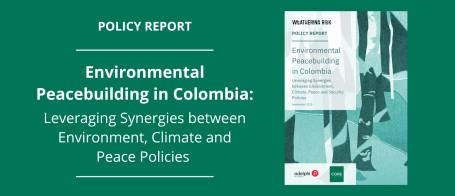Environmental Peacebuilding in Colombia
This report analyses the peacebuilding policy approaches of the Santos, Duque, and Petro administrations in Colombia and explores environmental peacebuilding good practices at the local level to address the intricate relationship between environmental degradation, climate change, and peacebuilding efforts. It presents recommendations for implementing an Environmental Peacebuilding Policy (EPP) to strengthen resilience and achieve sustainable peace.

Read the full report here
Colombia’s pursuit of peace and sustainability has been complicated by decades of armed conflict, persistent inequality, and increasing climate pressures. Rising temperatures, shifting rainfall, and intensifying El Niño and La Niña events also threaten rural livelihoods. At the same time, illicit economies, deforestation, and a weak state presence continually fuel violence and environmental degradation, particularly in the Amazon and Pacific regions where Afro-Colombian and Indigenous communities are disproportionately affected.
The report’s key findings show that:
- Climate risks and conflict are mutually reinforcing: Environmental degradation, resource competition, and climate-driven disasters worsen existing vulnerabilities in conflict-affected areas.
- Peacebuilding approaches have been fragmented: From the 2016 Peace Accord to mostly hard security anti-deforestation campaigns, national responses have lacked coordination with the local level and across the various peace, climate, and development strategies.
- Local solutions offer hope: Community-led initiatives, such as ex-combatant forest restoration, cocoa agroforestry, indigenous biodiversity governance and ecotourism, showcase the potential of environmental peacebuilding in helping foster resilience and trust.
- Large gaps remain: Weak state presence, uncoordinated implementation, and transnational criminal networks continue to destabilise rural communities and undermine efforts at both environmental protection and peacebuilding.
Key Policy Recommendations
- Establish a comprehensive Environmental Peacebuilding Policy (EPP) that integrates environmental protection and climate action into peacebuilding.
- Strengthen civilian-led state presence in conflict-affected areas whilst protecting local communities and addressing root causes to restore trust.
- Enhance coordination across peace, agrarian, climate, and conservation policies to prevent duplicate efforts and conflict.
- Support decentralised implementation and empower local authorities, Indigenous peoples, and Afro-Colombian communities as key actors in peacebuilding.
- Ensure gender-inclusive governance by recognising women and diverse populations as central to resilience and environmental stewardship.
- Partner with the international community to align climate and peacebuilding finance, promote sustainable agriculture, and push for fairer global trade standards.
Share on

